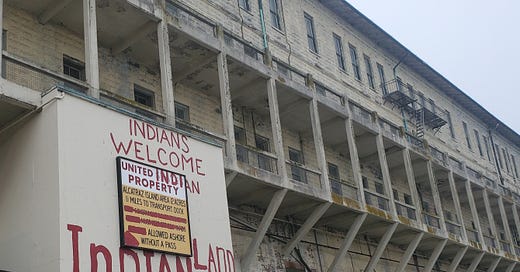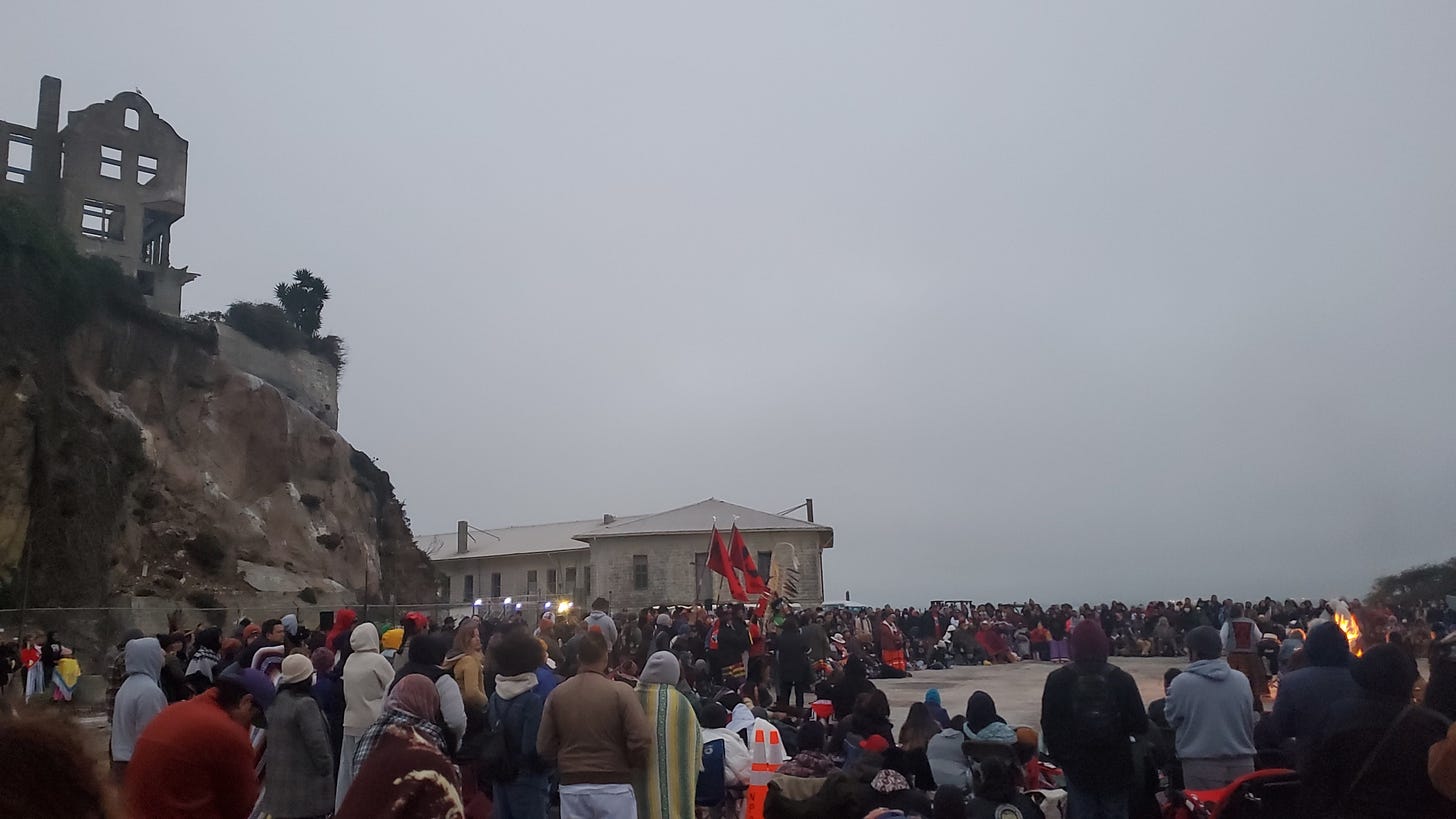Introductory note: I gave this text as a short talk on October 8, 2022 for the EarthLab’s Playing with Fire: A Hot Symposium at University of California, Santa Cruz. This text is also an excerpt from a full-length talk and chapter-in-process that will likely be in my next book.
Yesterday, October 10, a friend bought us tickets to the Indigenous Peoples’ Day sunrise ceremony at Alcatraz. While on the island, listening to the morning prayers and commentary, watching dancers, and listening to drums, I thought about the ideas presented in this piece—ideas about whose apocalypse we confront now, and whose framing within which we get told to interpret what we live through.
The annual Alcatraz gathering, occurs on what is now called “Indigenous Peoples Day” (formerly Columbus Day) and is an annual recognition of the “Indians of All Tribes” occupation of Alcatraz that occurred from November 1969 to June 1971, a protest that sought to return federally-controlled property to Native people. I am uncomfortable with large crowds, but I appreciated my friend’s gesture so I hauled myself out of bed at 3:45 am to catch a 5:15 am ferry in the dark to the San Francisco Bay little rock of an island.
I am also not a fan of state-sanctioned recognition efforts like “Indigenous Peoples Day” or “Native American Heritage Month” that blur the differences between Peoples co-constituted with very different places. Such events stretch the terms “Native American” or “Indigenous” beyond their usefulness to us as concepts for political organizing across vast land- and waterscapes. Pan-Native terms get used by the settler state in both programmatic and rhetorical moves that seek to blur Indigenous sovereignties into a settler state rainbow of multicultural inclusion into their nation-building project, which ultimately undermines ours.
When asked to support the celebration of such days or months, my response is always, “My entire life is about supporting “Indigenous” or “Native American” people’s sovereignty. Every day is a day for Indigenous Peoples for me. What does engaging in such a celebration get us?” It’s a genuine and not a rhetorical question. I am willing to support such recognitions, if there are pragmatic (e.g. resource-related) benefits that help ease suffering.
That said, here is the talk text I presented in Santa Cruz on October 8. Happy listening and/or reading.
Art, culture, and media scholar, Heather Davis, and Métis anthropologist, Zoe Todd have written on the importance of decolonizing the Anthropocene, and the need to “open…it up beyond its current Eurocentric framing.”[1] Davis and Todd argue that rather than dating the beginning of the “Anthropocene” to the birth of agriculture, the advent of the steam engine, or to the mid 20th century, the Anthropocene should be dated to the beginning of the colonial period, approximately 1610.[2]
Davis and Todd follow geographers Simon Lewis and Mark Maslin, who proposed 1610 for two historical reasons also reflected in the geologic layer:
1) 1610 marks the massive exchange of plants and animals between the Americas and Europe that “drastically re-shaped the ecosystems of both of these landmasses;” and
2) 1610 also marks a “drop in carbon dioxide levels…that correspond[s] to the genocide of the peoples of the Americas and subsequent re-growth of forests and other plants.”[3] That is how extensively Indigenous peoples managed, and were not only managed by the land.
In their Anthropocene paper, Heather Davis and Zoe Todd “explicitly acknowledge the entangled violences of the Transatlantic slave trade and the genocidal dispossession of Indigenous peoples and territories.” So 1610 also marks an era of violent and massive transfer of human relatives and wealth from Africa to colonial overlords in the Americas and in Europe.[4] Dating the inception of the Anthropocene to this era not only attends to the geological story, but it pushes back against the assumption that humans en masse, rather than certain humans, are implicated in anthropogenic change.
We all experience the devastating effects of Indigenous genocide in the present as well. Increasingly catastrophic fires on the west coast of North America result from Anthropogenic change that includes disappearing, displacing, and disempowering Indigenous peoples, thus suppressing many centuries of Indigenous peoples’ knowledge of how to live carefully with the powerful entity that is fire.
Powerful Entities
Lightening aids fire, and humans are a weak match.
I was in San Francisco for the week of the first lightning strikes in August, 2020. It was shockingly warm. About 3 a.m. the morning of August 14, as I slept soundly with all of the windows open, a sudden gust of wind slammed like a poltergeist every open door in the apartment. I jumped out of bed to witness from the large west facing window hundreds of gorgeous white hot lightning bolts striking down from the skies over the hills of San Francisco, and out over the Pacific.
I lived in Santa Cruz, Mendocino County, and Berkeley on and off from 2001 to 2012. I have never seen anything like the 44C heat we endured that week nor lightning of that intensity. From the 14th to the 16th of August over 2500 lightning strikes were recorded in Northern California. Three massive wildfires burned nearly 1.5 million acres, turned the skies dark, then orange, and rained down ash.
My daughter and I were visiting the Bay Area before we dropped her off at a hilltop farm in Sonoma County for an internship. We delayed her arrival there; with fires nearby, the farm was ready to evacuate at any minute. So Carmen and I decided to leave California and return when it was safer. We crawled on four wheels with many others on I-80 through patches of roadside flames up into so-called Tahoe National Forest, and descended into the desert of what is today called Nevada. As we left the densely built coastal cities behind, we sped toward my Dakota Oyate homelands in Minnesota to escape the ash, smoke, and fire.
Not My Apocalypse
In 2015, I had a conversation on stage at the University of Alberta entitled "Matters of Life and Death." I discussed with Sha LaBare, also a UCSC History of Consciousness graduate and a feminist science studies thinker, “The Future in Question,” and our different individual histories. In response to Sha’s deep ecological grief and sense of urgency, I expressed feelings I still work to describe with clarity.
Dakota people’s apocalyptic grieving has a longer timeline; we are at a different stage of grief. The genocide over hundreds of years of Indigenous peoples in the Americas and the co-decimation of nonhuman relatives and their societies brings us and you to here. It is this world built out of our apocalypse that is now at risk. Dakota people grieve what this world still celebrates in its doctrines, anthems, explosions, and glorious accounts. Sha responded with a quote from speculative fiction writer, William Gibson: “The future is already here. It’s just not evenly distributed yet.”
Since at least 2015 and that conversation, I’ve been trying to figure what it means to live in the fiery end of US empire as a Dakota—as a great-great-great grandchild of a People who suffered 160 years ago their/our own apocalypse in 1862 as this empire was ascendant. Long before Korea, Vietnam, Afghanistan, or Kuwait, my people and other Indigenous peoples from lands now absurdly claimed as US “Homeland,” were casualties of US empire building.
And yet, I am now an aging intellectual with four reliable wheels, English as a first language, and a well-used US passport. I have a relatively high degree of privilege within this settler-colonial structure. I continuously confront the question, where do I individually stand? Where am I able to move? What do I have to lose in declining US empire versus what has been lost by my collective, the Dakota Oyate? And by the Indigenous Peoples co-constituted with these lands where we sit and stand today? Indigenous peoples have had US citizenship and systems forced onto us after our populational decimation. Might we therefore see the settler state project and its non-negotiable costs more clearly?
What I struggled to communicate to Sha LaBare and to our audience at the University of Alberta in 2015, is that I think that there is not a novel sense of despair among Indigenous communities that I come from and work with. We Indigenous people in lands occupied by the US and Canada are also not disconnected from broader societies built upon our genocide, and that now mourn or disavow their own decline. We are not disconnected from settler’s present day economic struggles, industry decline, mass shootings, suicides, addictions, and climate crisis. But it is striking to observe a new psychic grappling by settlers with end times. They seem surprised by events that disrupt their mythological narratives of progress.
Consider this. What if one has not inhabited to the same degree, a settler-colonial progressive narrative? Then the material suffering of climate crisis, of the Anthropocene, of the sharp decline of US empire, is not an unknown or new order of material deprivation. Rather, it might be what Dominican-American writer Junot Díaz refers to as a “sharpening of the already present.” If one has not found shelter within a progressive colonial narrative, then one might not experience the same kind of diminished ontological faith or crisis in worldview—even while one experiences ongoing or increased material deprivation with settler state decline. Not everyone is experiencing the same negative intellectual, emotional, and moral shift in the universe as settler empire falls.
In this moment, I see an opportunity for a sharpening of moral clarity across the land. The apocalypses that Indigenous and Black peoples have suffered for half a millennium are blossoming into settler state reckonings. That the violence and unsustainability of colonialism is now confronted by an ever wider number of people feels productive and ethically clarifying. We are more able to deny the genocide deniers, those who have denied our apocalypses while building their homes and farms, factories, institutions, and wealth upon stolen lands using stolen bodies and labour.
A Call to Be Bad, not Good Citizens
I worry that many of my fellow humans cannot see a horizon beyond the US and Canadian settler states. While I sympathize with pragmatic strategies that take aim within settler state electoral politics, law, and policy to lessen oppression and resource disparities, I am dismayed when my relations—both Indigenous and not—in the streets of South Minneapolis or in Portland, Oregon couple state politics with the language of liberal patriotism or good “citizenship” in their righteous opposition to the empire’s violence.
To quote my University of Alberta colleague, Jessica Kolopenuk from Peguis First Nation, and her article “Provoking Bad Biocitizenship”:
I charge non-Indigenous and Indigenous peoples alike to be bad: unpack and undermine the investments they have in propertied and rights-based individualism, state-based sovereignty and nationalism, capitalist cultures of consumption, and settler fantasies of being rightful and good.[5]
I do not subscribe to the notions, “this is not us” or “this is not normal,” ideas frequently expressed by USians since the 2016 presidential election. What I grasp in the last six years is similar to Junot Díaz’s assessment of our recent political turn. He said:
I would not say that this is a different order of madness. I think it is a sharpening of the already present madness.”[6]
I shorten this to a “sharpening of the already present”—a moment in which the violent policies and strategies of US empire first enacted upon Indigenous peoples on this continent, and African peoples, and Black people, then enacted on other peoples abroad, are now returning home to a wider array of populations within lands that the US occupies and calls its own. In this sharpening of the already present, an ever-widening circle of humans are kept beyond the border of legitimate citizen, or the human worthy of consideration by the state.
I think Jessica Kolopenuk would tell us then to embrace our badness…..and stop investing our self-worth and futures of freedom in a violent settler state, which can also be complemented by a second idea that I borrow from Junot Díaz.
Radical Hope
In 2018, I gave a keynote at a conference on disasters, displacement, and human rights. The symposium description explained that “moments of transition bring about crisis, uncertainty, and even opportunity.” Organizers posed the question, “What factors shape whether a transition is a crisis or an opportunity, and in whose eyes?”
In a 2017 podcast interview, Díaz essentially answered that question as he explained two entangled ideas: 1) misalignment with the mainstream “emotional baseline” and; 2) “radical hope.” [7] Díaz considered the state of the world. He noted that “Trump is the latest, awful. . .turn” [we can add to that starkly visible climate emergencies], but “the world has been in an awful state for a long time.” Díaz asked rhetorically, “how are you conceptualizing this challenge?. . .The ability to do what our societies seem incapable and unwilling to do is important. . . . [T]here is nothing,” he argued, “more critical than to be misaligned. . .with the emotional baseline of any mainstream society.”[8] This applies as much to climate crisis as it does our foreboding and entangled electoral politics.
In this present moment, there is a rare opportunity to build off surging momentum among those who are misaligned, to actually push that emotional baseline—to try and do what this society has seemed “incapable and unwilling to do.”
The emotional baseline with which I suggest being misaligned is the incessant dreaming, in whatever political tone, of a successful settler state. We do not only face in this moment risk from Anthropogenic change, climate crisis, and the implosion of the western colonial project. We can also constitute hope in the implosion of the progressive colonial narrative. Not Barack Obama’s vacuous notion of multicultural “hope,” but the radical hope that Junot Díaz names when he professes his “trust in the collective genius of all the people who have survived these wicked systems.” He thinks “from the bottom will the genius come that makes our ability to live with each other possible.” Living well together, making relations: In this moment, this hope seems less radical to me than it did several years ago.
This moment offers an opportunity to cease cultivating love for the state no matter the parties in power. This moment makes space, if we choose to move into it, to be misaligned with the emotional, intellectual, and (un)ethical baseline of those in power. Instead, we can radically hope, script a narrative that foregoes the paradoxical dream of making a colonial empire more inclusive and more relational with the earth.
Instead, we can take this opening to move into relational frameworks and care for one another as relations. We are seeing proposals for institutional, political, and material changes to enact different kinds of relations. We see them arise from “the collective genius of all of the people who have survived these wicked systems.”
Sources
[1] Heather Davis and Zoe Todd “On the Importance of a Date, or, Decolonizing the Anthropocene,” ACME: An International Journal for Critical Geographies Vol 16(4) (2017): 763. See https://www.acme-journal.org/index.php/acme/article/view/1539.
[2] Ibid.
[3] Ibid. 766.
[4] Ibid. 772.
[5] Jessica Kolopenuk, “Provoking Bad Biocitizenship,” Hastings Center Report May-June 2020, S28.
[6] Krista Tippett, “Junot Díaz: Radical Hope Is Our Best Weapon,” On Being, September 14, 2017, https://onbeing.org/programs/junot-diaz-radical-hope-is-our-best-weapon-sep2017/.
[7] Ibid.
[8] Ibid.
















Share this post